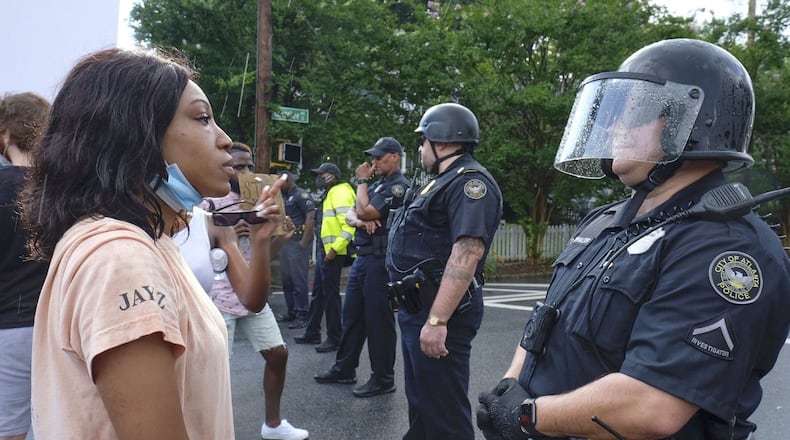Los Angeles Mayor Eric Garcetti is receiving considerable criticism for his decision to reduce police funding by $150 million. Actually, he is onto something, and he is not the only one. If cities want to reduce crime, we should invest in solutions that actually accomplish that goal.
We have borne witness to too many high-profile episodes of extreme police violence in our cities since the assault on Rodney King in 1991. Each time, we hear the claim that these incidents are by no means a reflection of our policing culture, but rather the result of a few bad apples. That is inevitably followed by a call for better training for police officers with an emphasis on improved community outreach. We have little to show for this approach in terms of changes in policing culture or a reduction in incidents.
There is something else going on here: We are severely over-policed – and, importantly, underinvested in communities. Atlanta is a microcosm of the opportunity for a different strategy.
In 1989, Atlanta’s rate of violent and serious property crimes was 17,903 per 100,000 residents. By 2018, there were only 4,463 crimes per 100,000 residents, a 74 percent reduction. This includes an 82 percent decline in the rate of violent crime. Even more starkly, in 1989 there were 246 homicides in Atlanta; last year, there were 88. In 1989, Atlanta had 52 crimes for every uniformed officer. In 2018, there were 14 per officer.
Between the mid-1960s and the early 1990s, America experienced a rapid increase in crime, and cities responded with vast investments in policing – a reasonable response to deteriorating public safety conditions. Yet we have continued to expand policing despite the massive reduction in crime since 1992.
It is tempting to conclude that the increase in police resources has led to the decline in crime. There is no evidence supporting that notion. The Government Accountability Office found that policing accounts for less than two percent of the decline in crime. The consensus among sociologists that have studied this issue is that crime is almost entirely driven by sociological factors, many of which have turned in our favor in recent decades.
We need police officers, but we need to narrow their focus to a core responsibility: responding to calls for service and solving crimes. We have a bloated police force. seeking out problems to address, and perhaps (unintentionally) creating them through aggressive policing tactics.
Reducing police funding would not mean that police departments would be eliminated. Instead, resources would be reallocated to transform and revitalize underinvested communities through housing, education and community health and wellness.
If Atlanta would reduce its police department by 50 percent, returning us to the crime per officer ratio we had in 2007, the city would save $125 million annually. Those funds could service $1.7 billion in bonds that could be deployed to make the type of investments in our most-distressed neighborhoods that would yield the neighborhood revitalization results we have seen in places like Atlanta’s East Lake neighborhood. Crime in East Lake is down more than 90 percent since 1995 because it is a healthy, thriving community where people of all incomes can prosper. It has high-quality housing, strong schools, a grocery store – everything that comprises a healthy neighborhood. The $1.7 billion in bonds spread across 10 neighborhoods that need revitalization in Atlanta would break the cycle of intergenerational poverty and truly advance the cause of racial equity in the city.
Neighborhood revitalization efforts resembling East Lake’s are already underway in several neighborhoods across Atlanta, including historic South Atlanta, Grove Park, and those supported by the Westside Future Fund. Several cities have initiatives using the same holistic model, like the Bayou District in New Orleans and the Highlander neighborhood in Omaha that are seeing similar results by investing in housing, education, and community health and wellness. That should be our aspiration for all neighborhoods.
If we really want to take bold actions to address the root causes of the problems we face – the generations of deliberate public policies and private actions that have segregated our cities and impoverished our Black citizens – now is the time to do it.
David Edwards is CEO of Purpose Built Communities. Shirley Franklin is executive board chair of Purpose Built Communities and the former mayor of Atlanta.
About the Author
Keep Reading
The Latest
Featured

